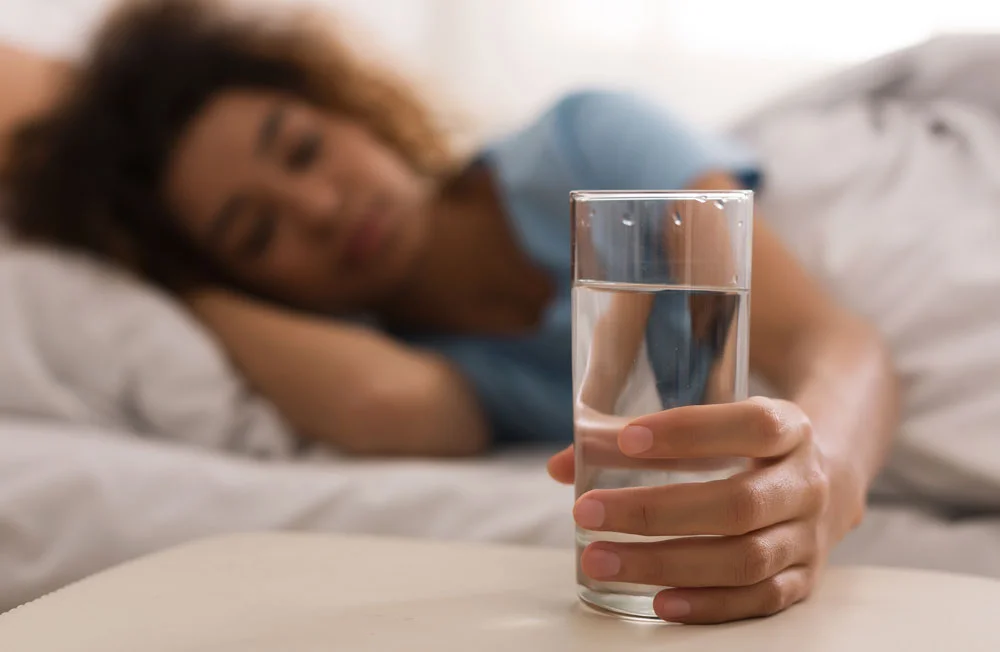
Almost everyone has a unique morning routine, specific to their individual needs. Some people prefer to rise before the sun and squeeze in a work out, while others prefer to take their time gently waking up in the morning. Sometimes people will fast in the morning, while others prefer to eat a big breakfast.
While most morning routines come down to personal preference, there are some things that are just universally a good idea. Recently, Dr. Emily Leeming shared a study on her Substack, Second Brain, that illustrates the benefits of downing a glass of water upon waking up. (1)
The study, which was published in the International Journal of Environmental Research and Public Health back in 2020, looked at the effects of drinking water on cognition and mood, and determined the amount of water necessary to drink after not having any for 12 hours. (2)
Read on if you want to hear more about what Dr. Leeming recommends, and what the study has to say about water’s impact on cognition and mood.
What Does The Study Say About Drinking Water?
The study was conducted by having participants not drink any water for 12 hours overnight. Then, in the morning, researchers gave participants different amounts of water to drink. A short time later, they measured the participants mood, memory, and levels of thirst. (2)
Researchers found that “a small amount of water (200 mL) was sufficient to alleviate feelings of thirst, improve hydration status, and attenuate anger, fatigue, and TMD in young adults, but a larger drink (500 mL) appeared to be necessary to improve working memory.” Additionally, researchers found that drinking 100mL or less (about 3 fluid ounces) isn’t really going to move the needle when it comes to your mood or memory. (2) Essentially, what this means is that 200 ml (about 6 fluid ounces) of water can help you feel less angry and tired, and 500 mL (about 17 fluid ounces) can help your brain work harder for you.
How Much Water Should I Drink When I Wake Up?
Practically, the results of the study suggests that if you drink about 2 standard measuring cups of water, or 16 fluid ounces upon waking up, you could help improve your memory during the day.
How Can I Make Sure I’m Drinking Enough Water?
Dr. Emily Leeming has a couple suggestions when it comes to getting enough water first thing in the morning. She does emphasize building the habit of drinking water first thing in the morning into your morning routine in the way that is right for you. Some suggestions that Dr. Leeming gives are to “keep a jug of water with a glass by your bed,” or to “drink a glass of water before and after brushing your teeth.” She also notes that you could try and “set a morning alarm to drink water or other fluids.” Dr. Leeming also has a suggestion if you don’t love chugging a cold glass of water first thing in the morning, she says that you can get some solid hydration by “drink[ing] a morning tea or coffee.” (1)
How Does Drinking Water Impact Sleep?
Being properly hydrated doesn’t just help you out during the day, it can also help you get better sleep at night. According to Sleepopolis, dehydration can keep you up because of a sore throat, dry mouth, and muscle cramps. Additionally, you lose water naturally while you sleep, which can contribute to dehydration.
To avoid sleeping dehydrated, and to stave off overnight dehydration Sleepopolis recommends hydrating throughout the day (drinking water right after you get up is a great place to start), eating food that has a high water content, and keeping your bedroom at a cool temperature to stave off sweating during the night.
Sources
- Leeming, Emily. Wake up and drink up. Second Brain. October 2, 2024. https://dremilyleeming.substack.com/p/wake-up-and-drink-up
- Zhang, Jianfen, Zhang, Na, He, Hairong, et al.,Different amounts of water supplementation improved cognitive performance and mood among young adults after 12 h water restriction in Baoding, China: A randomized controlled trial (RCT). International Journal of Environmental Research and Public Health. 2020. DOI:https://doi.org/10.3390/ijerph17217792


























